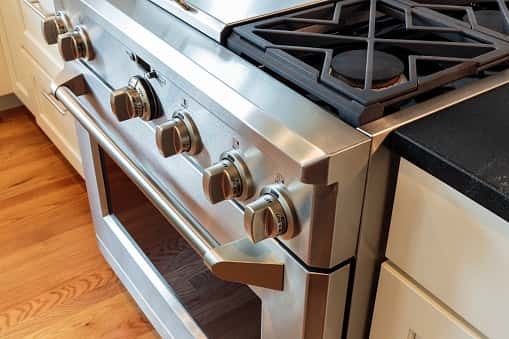Gas vs. electric appliances
With new tech, some electric appliances outperform gas ones

According to Joan Mazzuca of Gambrick Construction in Point Pleasant, New Jersey, “Gas appliances, such as stoves and water heaters, have traditionally been viewed as more energy-efficient due to their rapid heating capabilities and direct heat transfer.” But Mazzuca, who’s a project manager for her family’s business, said she’s recently reevaluated her advice to homeowners deciding between electric and gas appliances.
“Recent advancements in electric technology, particularly in induction cooktops and heat pump systems, have closed the gap considerably,” Mazzuca explained. Although gas appliances are, in general, more efficient and powerful than traditional electric appliances, many new electrical appliances with advanced technology now outperform gas appliances.
Key insights
- In terms of safety, efficiency and performance, new electric appliances with advanced technology, like induction ranges or cold-climate electric heat pumps, take the cake.
- Natural gas appliances typically outperform traditional electric appliances.
- New research indicates gas appliances negatively impact the environment and indoor air quality.
Gas vs. electric: safety
Both gas and electric appliances have a few potential safety hazards — we’ve outlined these below.
Are gas appliances safe?
Recent studies of gas appliances raise concerns over methane emissions and indoor air quality. Gas appliances emit more pollutants, including carbon monoxide and methane, a greenhouse gas that’s 86 times more potent than carbon dioxide.
If you use gas, be sure your home has proper ventilation. You’ll also need to install and regularly test a carbon monoxide alarm if you don’t already have one.
Are electric appliances safe?
Electric appliances carry a slight risk of fire and electrocution if not properly installed and maintained. Make sure any electric work in your home is performed by licensed professionals.
Bottom line
Electric appliances are the safest choice if your primary concern is air quality, but they do carry a slight fire risk.
» MORE: U.S. air quality trends
Gas vs. electric: costs
In general, it’s still cheaper to run most appliances with natural gas than electricity because gas appliances tend to be more efficient. Still, a handful of electrical appliances, like cold-climate heat pumps and induction ranges, have lower operating costs than gas appliances due to recent technological advancements.
Consult the yellow EnergyGuide label to find appliances with low operating costs.
The best way to pick an appliance that will lower your utility bill is to consult the yellow EnergyGuide labels when shopping for appliances. You should also check the price of natural gas and electricity where you live since costs vary by location.
Bottom line
Technologically advanced electric appliances are the cheapest to run, with gas appliances coming in second. Traditional electric appliances are the least efficient.
» LEARN: How to save energy at home
Gas vs. electric ranges
The most energy-efficient, fastest, cleanest and highest-performing ranges use electric induction technology. These ranges employ electromagnetic fields to heat the cookware directly and can boil water at least 20% faster than a gas stove.
Deann, a ConsumerAffairs reviewer from Indiana, was thrilled with their decision to switch to an electric induction stove from LG. “I never liked or would even consider electric cooking before,” they said. “But this is an absolute dream.”
I never liked or would even consider electric cooking before, but this is an absolute dream.”
The upfront costs for electric induction ranges were high initially but have fallen steadily over the years, with some models priced at $1,000. Apart from these induction models, gas ranges outperform traditional electric ranges and are more efficient.
Bottom line
The most efficient and highest-performing ranges use electric induction technology.
» COMPARE: Best ranges, ovens and stoves
Gas vs. electric grills
If you’re a grill master, you might be wondering whether you should choose gas or electric for your outdoor grill. The differences really center on how you plan to cook your food.
- Gas: A gas grill connects to a gas line (for fixed grills) or a propane tank (for portable grills). Gas grills tend to infuse food with more of a campfire flavor than electric grills since they use an open flame — but they might be restricted in your area. Be sure to check local ordinances before you buy one.
- Electric: Outdoor electric grills tend to be smaller than gas grills and can be moved and used anywhere there’s an outlet. It’s easier to maintain a constant temperature using an electric grill, which gives you more control over your food while cooking.
- Other options: When it comes to grills, charcoal and mesquite impart the most authentic grilled flavor. They’re also usually cheaper and can be easier to transport to campsites and other locations since you don’t have to hook up to a gas line or electrical outlet.
Bottom line
For the best flavor, use charcoal or wood briquettes instead.
» COMPARE: Best grill brands
Gas vs. electric fireplaces
If you already have gas or electric lines running to your fireplace, you might find it easiest to go with what you have. If you’re open to a new installation, there are pros and cons for both types.
- Gas: Gas fireplaces have faux logs but use a real flame to create a warm, cozy atmosphere. These fireplaces aren’t cheaper to operate than electric, though — it takes more gas than electricity to make the same amount of low-grade heat, so your bill will be higher for gas.
- Electric: Electric fireplaces create heat that’s warm and inviting, but they don’t have that familiar flame. Instead, they just radiate ambient heat from warmed coils like a space heater. On the other hand, they’re more efficient and will keep your heat bill lower than you'd get with a gas fireplace. They’re also a bit safer since they have no flames.
Bottom line
If you care more about cost savings, electric is the way to go.
Gas vs. electric dryers
While manufacturers no longer make gas washing machines (they’ve been replaced by high-efficiency electric washers), you can choose gas or electric for your dryer.
- Gas: Gas dryers are usually a little more expensive to buy, but you’ll see savings on your utility bill in the long run. Gas units dry clothes faster and use less energy.
- Electric: Electric dryers are cheaper initially. While gas dryers require a vent to the outside, some electric dryers don’t; you may be forced to choose a ventless electric dryer depending on your laundry room’s setup.
Bottom line
Gas dryers are cheaper to operate but more expensive to buy.
Article sources
- All Dry USA, “ How Much Does It Cost To Fit A Gas Line? ” Accessed Aug. 12, 2023.
- Burgeson's Heating, A/C, Electrical, Solar & Plumbing, “ Burgeson’s, What’s the Cost to Install a Gas Line? ” Accessed Aug. 12, 2023.
- The Home Depot, “ Outlet Installation .” Accessed Aug. 12, 2023.
- National Library of Medicine, “ Cooking with Natural Gas: Just the Facts, Please .” Accessed Aug. 11, 2023.
- Nebraska Department of Environment and Energy, “ Annual Average Electricity Price Comparison by State .” Accessed Aug. 13, 2023.
- Office of General Services, “ GreenNY Specification: Residential Clothes Dryer .” Accessed Aug. 11, 2023.
- U.S. Department of Energy, “ Estimating Appliance and Home Electronic Energy Use .” Accessed Aug. 11, 2023.
- U.S. Department of Energy, “ Gas and Electric Ovens, Stoves, and Ranges .” Accessed Aug. 11, 2023.
- U.S. Department of Energy, “ Heat Pump Systems .” Accessed Aug. 11, 2023.
- U.S. Department of Energy, “ Making the Switch to Induction Stoves or Cooktops .” Accessed Aug. 11, 2023.
- U.S. Energy Administration, “ U.S. households’ heating equipment choices are diverse and vary by climate region .” Accessed Aug. 11, 2023.
- U.S. Energy Administration, “ Natural Gas Prices .” Accessed Aug. 13, 2023.
- Robinson’s Plumbing Service, " How Much Does It Cost To Install A New Gas Line? ” Accessed Aug. 12, 2023.
You’re signed up
We’ll start sending you the news you need delivered straight to you. We value your privacy. Unsubscribe easily.
